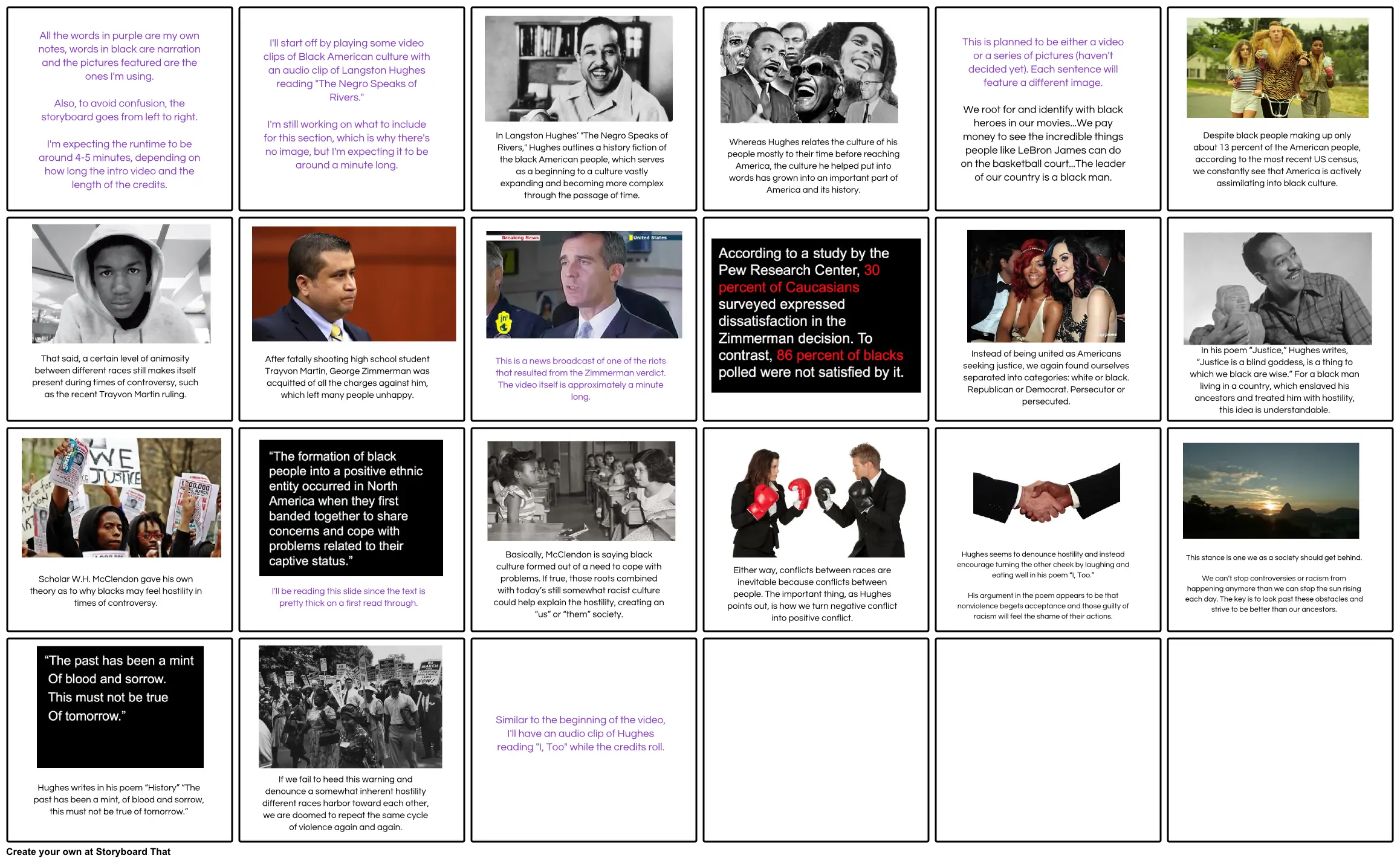American Poetry Project Two Storyboard

Testo Storyboard
- All the words in purple are my own notes, words in black are narration and the pictures featured are the ones I'm using. Also, to avoid confusion, the storyboard goes from left to right. I'm expecting the runtime to be around 4-5 minutes, depending on how long the intro video and the length of the credits.
- I'll start off by playing some video clips of Black American culture with an audio clip of Langston Hughes reading "The Negro Speaks of Rivers." I'm still working on what to include for this section, which is why there's no image, but I'm expecting it to be around a minute long.
- In Langston Hughes’ "The Negro Speaks of Rivers," Hughes outlines a history fiction of the black American people, which serves as a beginning to a culture vastly expanding and becoming more complex through the passage of time.
- Whereas Hughes relates the culture of his people mostly to their time before reaching America, the culture he helped put into words has grown into an important part of America and its history.
- This is planned to be either a video or a series of pictures (haven't decided yet). Each sentence will feature a different image.
- We root for and identify with black heroes in our movies...We pay money to see the incredible things people like LeBron James can do on the basketball court...The leader of our country is a black man.
- Despite black people making up only about 13 percent of the American people, according to the most recent US census, we constantly see that America is actively assimilating into black culture.
- That said, a certain level of animosity between different races still makes itself present during times of controversy, such as the recent Trayvon Martin ruling.
- After fatally shooting high school student Trayvon Martin, George Zimmerman was acquitted of all the charges against him, which left many people unhappy.
- This is a news broadcast of one of the riots that resulted from the Zimmerman verdict. The video itself is approximately a minute long.
- Instead of being united as Americans seeking justice, we again found ourselves separated into categories: white or black. Republican or Democrat. Persecutor or persecuted.
- In his poem “Justice,” Hughes writes, “Justice is a blind goddess, is a thing to which we black are wise.” For a black man living in a country, which enslaved his ancestors and treated him with hostility, this idea is understandable.
- Scholar W.H. McClendon gave his own theory as to why blacks may feel hostility in times of controversy.
- I'll be reading this slide since the text is pretty thick on a first read through.
- Basically, McClendon is saying black culture formed out of a need to cope with problems. If true, those roots combined with today’s still somewhat racist culture could help explain the hostility, creating an “us” or “them” society.
- Either way, conflicts between races are inevitable because conflicts between people. The important thing, as Hughes points out, is how we turn negative conflict into positive conflict.
- Hughes seems to denounce hostility and instead encourage turning the other cheek by laughing and eating well in his poem “I, Too.” His argument in the poem appears to be that nonviolence begets acceptance and those guilty of racism will feel the shame of their actions.
- This stance is one we as a society should get behind. We can’t stop controversies or racism from happening anymore than we can stop the sun rising each day. The key is to look past these obstacles and strive to be better than our ancestors.
- Hughes writes in his poem “History” “The past has been a mint, of blood and sorrow, this must not be true of tomorrow.”
- If we fail to heed this warning and denounce a somewhat inherent hostility different races harbor toward each other, we are doomed to repeat the same cycle of violence again and again.
- Similar to the beginning of the video, I'll have an audio clip of Hughes reading "I, Too" while the credits roll.
Oltre 30 milioni di storyboard creati

